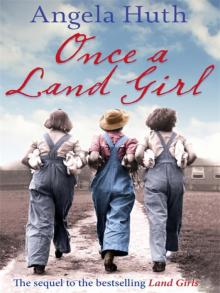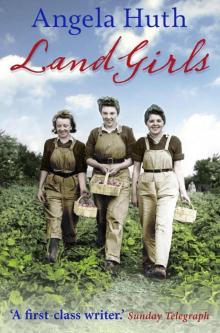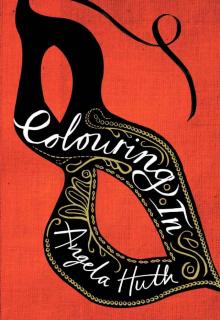- Home
- Angela Huth
Once a Land Girl Page 3
Once a Land Girl Read online
Page 3
This new blow – he had never thought of himself as an older man – caused Barry to reach for his wallet. He took out a five-pound note, the huge piece of fragile white paper folded into crisp edges, its black script a beautiful pattern scrawled across it. ‘Here, take this,’ he said. ‘Get yourself a couple of new dresses and we’ll go somewhere grand. Bright lights, pancakes set alight, crapes they call them—’
‘I can’t take money from you. Thanks all the same.’ Prue handed back the note.
Barry pushed it away impatiently. ‘I want you to.’ Prue heard the truth of this in his voice. She resisted no more – too much resistance, she had learnt, meant you could miss out on valuable things. She put the note in her bag. Never having been in possession of so much money in her life, she felt light-headed.
‘You treat yourself,’ Barry was saying. ‘If you need more, you only have to say the word.’ There was a catch in his voice, a softness she had not detected before. Had kindness or nefarious intent spurred such generosity? Prue wondered. It was the last time she wore the blue dress.
The following week Barry arrived in a tie that shone like beaten gold, and Prue wore a new dress of amber crêpe that fluttered round her legs like a breeze. It had taken most of her saved coupons and was, her mother assured her, a wonder. Barry’s look was complimentary. ‘That’s better,’ he said. ‘That makes a change.’
They drove to a large hotel in the centre of Manchester where Prue went round the glass entry doors several times. She had never been to such a place before and the view of red carpets, pillars and posts with golden edges made her laugh.
‘You’re quite a child sometimes,’ Barry said, when she had finished merry-go-rounding. ‘You need looking after. You could do with a firm hand.’ Prue laughed again. She was used to his slight criticisms. They didn’t offend. She gave him her wrist – a little nervous of all the red carpet – and they went into an enormous white dining room where a waiter at the entrance gave what Prue supposed was a bow. He showed them to a round table so dazzling with white napery that Prue rubbed her eyes in the way people do when caught out by snow. There was a confusion of cutlery, too – which knife or fork or spoon should she choose first? Such a collection of silver was unnerving. In a tall thin vase a single rosebud stood at attention. It would never open, Prue thought, though she chose not to mention this to Barry in case he took it as a reproach. In the great white lake of the place a few other diners sat at far-apart tables like people stranded on islands. Their mouths moved, but there was no sound.
Barry guided Prue through the short menu with some delicacy. Not a French speaker himself, a decade of studying menus had left him with a certain ability to understand culinary language, made easier, these days, by the paucity of post-war choice. Prue was impressed and agreed to all his recommendations. She was further impressed by his exchange with the wine waiter, mentioning names and vintages that meant nothing to her.
As they ate their miniature cutlets, almost hidden beneath paper ruffles, and Barry spoke of the childhood love affair with cars from which his present business had begun, Prue studied his face. She had never seen it before in such a good light: the pubs had all been so gloomy. Here, the dark eyes sparkled, the pockmarked nose shone. The thin line of his top lip was less noticeable when he smiled: a smile also reduced the heaviness of his long jaw. Not exactly handsome, thought Prue, though from a distance he might be considered quite passable-looking. But she was aware of being used to his face, fond of it. She regarded him as a kindly uncle. She was grateful to him for taking her out in his amazing car, buying her as many drinks as she wanted, and now bringing her to this place. Most of all she was grateful that he had not tried any hanky-panky, and it looked as though he never would.
Three elderly musicians entered in an orderly line, crossed the small dance-floor and took up their positions. They wore dinner jackets whose shoulders were uniformly bronzed with wear. Prue did not see a look pass between them, but when the pianist gave a slight nod they started to play a somnolent version of ‘Pack Up Your Troubles’. Barry jumped up so fast he knocked over his wine. Red surged over white. From behind pillars several waiters ran to deal with the emergency. ‘Dance, Prue?’ he said, holding out his arms.
Here goes, she thought, embarrassed by all the fuss at the table, such tall strong rather handsome men dealing with a mere glass of spilt wine. Here goes, Mum’s wish come true: fox-trotting.
In her high heels, Prue was only an inch shorter than Barry. He led her through the maze of tables to the floor. One other couple had got there first. Married, they looked, as they gently rocked like an old boat at low tide. Barry put one hand round Prue’s waist: he held her hand very high, as if clutching a long skirt to avoid a wet street. He moved, tilting his head fractionally toward her.
Barry was a dancer whose enthusiasm outreached his talent. As they traversed the floor Prue was aware that, while his feet kept in time, his body lacked the essential rhythm to match her own. She longed for him to be livelier, but that was plainly beyond him. His Brylcreemed head bent lower towards hers: to avoid it, she was forced to bend her neck into a painful position. ‘Gee, it’s great to be walking back late, walking my baby back home,’ slurped the music.
Prue shut her eyes and thought of the party she had gone to with the girls and Joe: a big hall somewhere, cold, chairs that squeaked on the floor, a buffet of bridge rolls and jellies in primary colours. It was there that Stella had been pursued by a tiny wing commander who danced like an angel. So brilliant was their dancing that others moved away from the floor and watched them perform like professionals who had danced together all their lives. At the end, Joe had stood up and clapped. Prue herself had paid less attention than she might to Stella, for she had caught sight of the flight lieutenant with whom she had recently exchanged glances in a teashop. She had made her way across to him and they danced – not like Stella and the wing commander, but with something flaring so hard between them that the edges of her legs, her arms, her body felt blurred, the flesh made soft. Unwisely she had accepted the flight lieutenant’s offer of several more drinks, and vaguely remembered being supported to the car. When they had got back Joe had carried her into the house, but she was long past being excited by Joe.
That evening was the beginning of her real love for Barry One. Barry One the brave airman with his crinkling eyes and floppy hair who had made her feel there was nothing she had to explain. Their language had been almost devoid of words, though their laughter always seemed to come together. Even when they had realized they loved each other they had made few declarations, both nervous of failing to choose the right words. “‘I love you” is the hardest line to say,’ Barry One had ventured not long before he was shot down – thereby conveying his feelings in a way that made Prue love him all the more. That first evening, when Prue’s dignity had flown and Barry One didn’t seem to mind, had been very different from the staid time she was now having with Barry Two, she thought, as she released her hand to rub her aching neck.
She was aware of the present Barry’s stomach pressing against her, and his quickened breathing. The band lurched into ‘I’m In The Mood For Love’. Oh, cripes, she thought. Here goes.
But Barry restrained himself. He didn’t speak in the car and didn’t grasp her wrist as they walked up the front path. In the porch he put a hand up and briefly touched her hair. ‘You’re a good girl, Prue,’ he said. ‘I hope you enjoyed this evening.’
Prue nodded.
‘And next time . . . next time, do you know where I’m going to take you?’ Prue shook her head, dreading the answer, but curious. ‘I’m going to take you to my house. I want you to see it. You’ve waited long enough.’ He said this with solemn conviction, as if he had no doubt that seeing his house was just what Prue had been longing for. ‘I’ll pick you up at the usual time.’
He twirled round, surprisingly nimbly for one who had drunk a good deal of his favourite vintage, and headed back to his car. Barry Morton plainly had pl
ans and she would have to think about them very carefully.
In bed, her own head quite clear, she began to weigh things up, an art she had never completely acquired. By dawn she was laughing silently at herself: she was running ahead in a foolish way. It was unlikely Barry Morton saw her as marriage material. It was quite possible he had no serious intentions whatsoever. He was simply biding his time, waiting for her to give in. Then the laughter turned almost to tears when she thought of how she had felt after that other, wartime, dance, with the other Barry, the proper one.
The Larches, as Barry’s house was called, stood very upright in a wide street on the outskirts of the city. It had been built in the era when builders aspired to fashionable mock-Tudor, and its neighbours were similar in appearance. The Daimler swooshed into a drive of deep gravel. The light in the porch was a lantern of stained glass. The front-door knocker was a brass lion’s head.
‘I was dazzled even before I got out of the car,’ Prue wrote later to both Stella and Ag, ‘but also a little uneasy. I had no experience of rich men’s houses.’
Barry led her through a thickly carpeted hall to what he called the front room. It was all he had promised. Three-piece leather suite, low velvet armchairs, indistinct pictures, a very grand mirror over the fireplace – a dark room, but when your eyes grew accustomed to its umber light it was possible to see that someone with an eye for rich colours had been in charge of the decorating. Prue was intrigued by the fire – gas, she thought, though it was hard to tell, so skilfully depicted were the imitation logs piled into a neat mound. Imitation flames flickered against the iron back, not quite the random colours of real flames but pretty good.
‘What a clever fire,’ she said at last.
Barry shrugged. ‘Like it all, do you?’
‘It’s amazing. Beautiful.’
‘You wait till you see the rest.’
On a low table by the fire there was a plate of sandwiches and two fragile glasses. Prue wondered if Barry had arranged all this himself – he didn’t strike her as a sandwich-making man. Perhaps there was some invisible servant who lived in the back of the house. The centre of each sandwich was decorated with a minute sprig of parsley. Surely Barry . . .
‘Shall we celebrate with some bubbly?’ he asked.
‘Celebrate what?’ The question had sprung from her inadvertently. ‘I mean—’
‘Celebrate the fact you’re here at last, sweetheart,’ Barry said. ‘I’ll just fetch it. Won’t be a mo.’
Alone in the room, Prue was able to observe that every piece of furniture, every ornament, the carpets, the tall silk curtains, must have cost unimaginable amounts of money. Barry Morton was obviously a very rich man indeed. Prue sighed.
In front of the fire that never died down, they drank the first bottle of champagne, and a second. They ate the fish-paste sandwiches. Prue longed for a bowl of soup, fish and chips, anything to calm her swirling head, but no suggestions of proper dinner were forthcoming. Was Barry Morton up to something? Prue giggled. ‘Are you up to something?’ she asked.
‘Up to something? What do you have in mind?’
‘Well, I don’t know. It’s all so surprising, this.’
‘There are more surprises.’ Barry walked over to Prue, put his muff-hand round her wrist, pulled her up. They stood facing each other, very close. Prue would have moved away had not her legs felt so unsteady. Her eyes had become a little out of focus, but she was able to see the piercing intent in his.
‘Now, my sweet Prue, I’ve something to tell you. I’ve been thinking about it very hard these months we’ve known each other, and I’ve made up my mind. I want you to be my wife. How about that?’
Prue fell backwards onto a chair. One leg tipped up, knocking the low table. Two champagne bottles, two glasses and the empty plate fell to the floor, silenced by the carpet. Her cheeks blazed. Behind Barry’s patient smile she saw a ghostly look of annoyance.
‘I’m so sorry.’
‘Don’t worry.’ In a trice Barry had picked up the fallen things and returned them to the table. He could see that this small, irritating accident had taken the edge off Prue’s answer, but he was a patient man. He wouldn’t alarm her by pressing her. He could wait. ‘I think you should see the rest of the house.’
‘Right.’
They went side by side up the staircase, its banisters of dark oak so thick they would have prevented an army from falling into the hall. Prue felt very much as she had on the night of the dance when the girls had had to support her to the car: everything swirled.
They went through a dark and silent door to the bedroom. In her unclear state Prue had a slippery picture of an enormous bed, shining satin eiderdown, dark drawn curtains, acres of carpeted floor, lampshades the colour of peaches. She crossed the room, knowing she was going to fall and not wanting to drop ignominiously to the floor. She let herself flop onto the end of the bed. Barry stood looking down at her, very serious.
‘What do you want?’ she heard herself say.
‘What do you think I want, sweetheart?’ An icicle of sweat ran down one of his cheeks. ‘What do you think I’ve been waiting for?’
He ripped at his gold tie with one hand, pulled up her pretty skirt with the other. Then he was hammering into her, groaning. It was all over very quickly.
Later in the night, while Barry Morton snored quietly beside her, Prue reflected it had not been like any other shag she had ever known – and she’d known quite a few. But, to be realistic, it seemed Barry was no better a lover than he was a dancer. Sex, however, Prue told herself, was not everything, and again she began to try to weigh things up. Here was the rich man she had always longed for, who could give her everything. There’d be no money worries as there always had been at home. He was solid, safe, agreeable, kind – wasn’t he? They could make a life. Be married, have children. She’d be better off than millions of girls in search of a husband. The shortage of men, after the war, was a disaster. If she didn’t say yes to Barry she might never have another chance. Prue turned, studied his thick shoulders in a chink of early light spearing the curtains, and made her decision.
When she woke Barry had gone. She was wondering what to do, how to make the long journey to work, when he came out of the bathroom. He wore a short towelling dressing-gown so that she was able to observe the peculiarities of his short legs. The shins were covered with black hair: the calves were hairless round balls that tapered to thin ankles. Prue swallowed.
Barry sat on the bed, took her hand. ‘Thought I’d let you sleep on a while,’ he said. ‘It’s six thirty.’
‘Thank you.’
He bent down, kissed her cheek. There was a strong smell of toothpaste and potent cologne. Then he crossed the room, calves trembling like jellies, to draw back the curtains. Nebulous light filled the room. The orange satin eiderdown made a frivolous patch of colour among the dark furniture. Barry returned to the bed. ‘Was it all right, last night?’ he asked.
Prue paused. She wished she’d had more time, this morning, to think about life with Barry Morton. ‘Course it was,’ she said, reaching for a smile.
Barry took her wrist. ‘And did you manage to think of an answer to my question?’ There was a pause. ‘Marriage? You and me, man and wife?’
‘Yes . . .’ Prue’s answer was so quiet Barry had trouble hearing it. But he gave a broad smile and kissed her cheek again. He made to get up, but was restrained by Prue’s hand on his arm. It had suddenly occurred to her that there was something she ought to know. ‘Why do you want to marry me?’
‘Well, obvious, isn’t it, sweetheart? A man needs a wife.’
‘But does love come into it at all? Do you love me?’
‘Course I love you.’ He sniffed. Glanced at his watch. ‘Breakfast on the table at seven, then I’ll drive you to work.’
‘I can still carry on helping Mum in the salon, can’t I?’
‘Don’t be daft, sweetheart. Not once we’ve tied the knot. I’m not going to have my wife wor
king. I’m a very rich man and you can have anything you want. Why would you want to spend your days in a hairdresser’s? You can tell your mum this morning. Give in your notice.’ He laughed, stood up and tightened the sash of his dressing-gown so that a roll of flesh bulged both above and below his waist.
They met again downstairs in the small dining room that overlooked a bare garden. The table was laid with a professional neatness that Prue found unnerving: Mrs Lawrence used to dump honey, jam and toast randomly on the kitchen table. She wondered again about the invisible servant who had produced tea, coffee, egg cups on matching plates, napkins in silver holders.
‘There’s a Mrs Morley, Bertha, who looks after me,’ said Barry. ‘She’s a wonder. Does everything. Been here some years. You’ll meet her.’
But Bertha didn’t appear before they left. In the car arrangements were discussed. They would carry on ‘as normal’, Barry said, until the wedding in a few weeks time, when the weather was better. After that, of course, she would move in. Prue found nothing wrong with the idea. She felt bruised, crushed, sore: was not impatient for another night of Barry’s inept lovemaking.
In the salon she found her mother. ‘I was so worried! Where were you?’
‘You must have known.’
‘Well, I suppose I guessed. You look ever so pale, Prue. Here, I’ll put the kettle on.’
‘Mum.’ Prue put an arm round her shoulders. ‘Barry asked me to marry him.’
Indignation flared briefly across Mrs Lumley’s face. ‘Well I never. What did you say?’
‘I said yes. You’ll never have to worry again, mum. Everything’ll be taken care of.’
‘Well . . . He’s an older man, isn’t he? But age never got in the way of true love, did it?’ She did up her pinafore, patted her hair. Tears came into her eyes. ‘I’m so pleased for you, Prue. You deserve the best. You’ve had some bad times with men.’
Prue giggled. ‘Not so bad,’ she said. They hugged each other, then drew apart to embark on a normal day of permanent waves.

 Sun Child
Sun Child South of the Lights
South of the Lights Virginia Fly is Drowning
Virginia Fly is Drowning Of Love and Slaughter
Of Love and Slaughter Such Visitors
Such Visitors Once a Land Girl
Once a Land Girl Land Girls
Land Girls Colouring In
Colouring In Nowhere Girl
Nowhere Girl Monday Lunch in Fairyland and Other Stories
Monday Lunch in Fairyland and Other Stories Another Kind of Cinderella and Other Stories
Another Kind of Cinderella and Other Stories Invitation to the Married Life
Invitation to the Married Life Easy Silence
Easy Silence